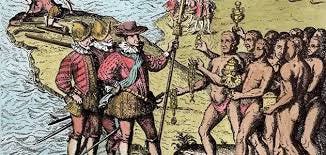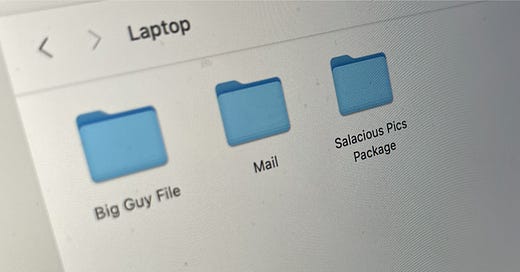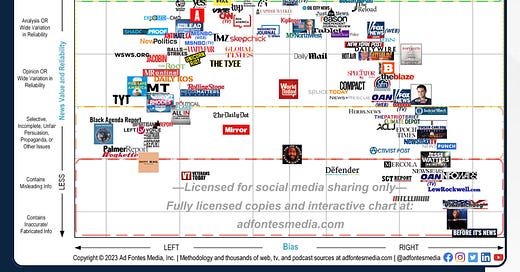
Discover more from The Freedom Academy with Asha Rangappa
How Christopher Columbus Ruined My Life
I have to explain to my children the difference between Native Americans and Indians simply because one man got lost one time.
This is a reprint of a piece I first published at the Huffington Post in 2016. I usually repost it each year on Twitter/X on Columbus Day, but decided to repost it here today. Enjoy!
“What are you?”
Growing up as one of the few Indian-Americans in southern Virginia, I always knew that when asked this question, I was supposed to identify my race. But the relatively straightforward answer, “Indian,” was anything but. In fact, the tortured exchange that usually followed made it one of the most dreaded questions of my childhood. I, and every other Indian-American, have one man to thank for that misery: Christopher Columbus.
When Columbus landed in what is now the Bahamas in 1492, he thought he was in India and accordingly dubbed the native population “Indians.” But the wave of immigration that actually brought the majority of Indian nationals to this country didn’t happen until the late 1960s, when immigration laws were loosened and Indians – often doctors like my dad who came to fill shortages created by the Vietnam War – were allowed to enter the country in greater numbers. Some of these opportunities were in places like my hometown of Hampton, Virginia, which had few Indian immigrants at the time but boasted a rich Native American history. Growing up, I attended Captain John Smith Elementary School, drove down Powhatan Parkway, and cheered for the football team of Kecoughtan High School, named after the tribe of Algonquian Native Americans who lived in the area at the time colonists arrived in 1607.
It was a wonderful place to get an on-location historical education, but as the sole student of Indian descent in my school in the 1980s – and usually the only one my classmates had ever seen – it was also a crash course in cultural confusion. Telling people that I was Indian could be met with a number of responses that might be expected of children who were routinely exposed to “Indian” history in their education: “What tribe?” “Do you live in a teepee?” or just a solemn, “How.” Despite the fact that more than 2 million Indian-born immigrants now live in the U.S., making them the second-largest immigrant group in the country, today’s school curricula have not changed much: A recent 4th grade Thanksgiving worksheet distributed in a New York public school had the title, “What Did Indian Women Do?” followed by fill-in-the blank answers for “tan hides,” “gather nuts,” and “make pottery.” It’s no surprise that identifying oneself as Indian today might still prompt the politically incorrect but clarifying follow up, “Dot or feather?”
The confusion Columbus created doesn’t end at America’s borders, either. As I learned while living in Bogotá, Colombia, the term indio – Spanish for “Indian” – is used specifically to denote the indigenous population living throughout Latin America. After a few baffled exchanges, I realized that people of Indian descent (few and far between on that continent) are referred to as hindú, based on the Hindu religion practiced by about 80% of India’s 1.2 billion inhabitants. I am in fact Hindu, but this label overlooks the religious diversity of India, which includes Muslims, Christians, Sikhs, and Buddhists, just to name a few faiths practiced there. Reducing all Indians to “Hindus” is as inaccurate (and potentially incendiary) as describing anyone with an Irish background as “Catholic” just because the nationality is already being used to describe another group that, by the way, is not Irish at all.
Some people believe that labels don’t matter, and that getting stuck on them only highlights our differences and divides us as citizens. It’s true that in the end, we are all Americans. But when individuals claim their African-, Italian-, Japanese- or other heritage as a part of their identity, they aren’t disavowing their American-ness. Rather, they are invoking a unique cultural narrative that has shaped their path and relationship to this country. Sharing and understanding these distinct histories is what weaves us together as one nation on the other side of the hyphen. Treating identities as interchangeable obscures these histories and does a disservice to the groups that have lived them.
I’m dismayed that I (still) have to explain to my children the difference between Native Americans and Indians simply because one man happened to get lost five centuries ago. But perhaps one day the way we refer to the people who live in America will recognize that the world is much bigger than Columbus had ever imagined.

















What a great post for today, Asha. I’m so glad your lived experience can enlighten us all, even though I know it was a challenge for you. America really is diverse and fascinating, and I hope we are moving towards more understanding rather than going backwards. You are a brilliant beacon.
You know, I never thought of the perspective of Indian-Americans regarding the inaccurate description of Native Americans / Indigenous People as "Indians". As always, valuable insight. Even before accurate descriptions became part of the common lexicon, it made no sense to me how in modern times, the term "Indian" became interchangeable between two vastly distinct and different groups in terms of geographic and cultural aspects. It is simply sloppy and incorrect terminology, but of course beyond that ignorant, arrogant, and other negatives that would have Trumpers classify me as "liberal" (they LOVE labels for the simplicity and convenience in a world that is not simple nor convenient). As a kid, I tagged along with my older brother to coin and stamp shows held at a VFW post once a month. He was into coins, but the stamps were what grabbed me due to the art and a fascination with geography and the world. I would introduce the world of stamp collecting to kids as it instills an interest in history and geography learned in a fun visual manner. Strangely enough, one of the interesting stamps that comes to mind as I write this is one from approximately 1974 if memory serves me correctly. It is a "block" set that is Indira Gandi speaking to Leonid Brezhnev on the hotline, and this of course very simply illustrates how India was non-aligned. The artistry is indelible, and it made an impact on me. Beyond that, it sets an understanding of history that one should know in order to understand somewhat geopolitical relations. Indeed, it made sixth grade a joy as I learned more about the history in the classroom, and got more perspective. One problem that Americans are often accused of is having a provincial and narrow outlook as many have not traveled abroad. An article I read recently by a British traveler discussed one reason for this, and it is because our country is so vast and varied, many of us can get our need for adventure satisfied close to home or without a passport. I liked that explanation because it wasn't the typical criticism of "Americans are fat and lazy"....my gosh, we are so varied, that is such a sweeping generalization that is ignorant in and of itself. Regarding the theme of Asha's commentary, its a bit of the "whatever" and, ugh, dare I say "brown people" attitude some have at just lumping people together indifferently with an elitist attitude. People like Dan Snyder can be the "whatever" types who fear a sports team name change from something outrageously offensive and insensitive to something civilized, modern, and decent will be submitting to the "woke". I can't understand why being "woke" is necessarily a bad thing.....I mean, do you want to sleepwalk through life? Hah, of all people I think of, it is the antagonist of the film "Animal House" Dean Vernon Wormer who says it best: "Fat, drunk and stupid is no way to go through life my son." I may be working on the first a little, but drunk and stupid are things I try to avoid at all costs. I want to be sentient to all the pleasure, and that includes the necessary occasional pain we all must suffer to appreciate that pleasure. Civilization has evolved through mental and spiritual growth, not regressive "Great Again" nostalgia for moving backwards. So "Happy Indigenous People Day" to all. With all due respect to Italians in particular who consider the holiday somewhat sacred, Columbus Day is a mattress sale holiday, and those of Italian heritage can do better for a heroic holiday. We owe Native Americans our gratitude and some time to pause and reflect on how they have been treated.